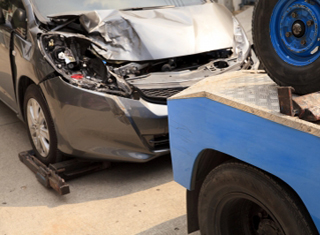These sad words carry the emotional attachment and financial investment in a vehicle that’s taken you everywhere you’ve wanted to go. Now you have to face some hard realities and make some potentially difficult decisions.  First, let’s define what it means to have a totaled car. Simply put, it means that it would cost the insurance company more money to repair the car than the car is worth, or its fair market value. It makes sense: why would the company pay $5,000 to repair a car that will only be worth $2,000 after the repair? It’s still devastating news, though, and if it ever happens to you, you’ll be faced with learning a new vocabulary.
First, let’s define what it means to have a totaled car. Simply put, it means that it would cost the insurance company more money to repair the car than the car is worth, or its fair market value. It makes sense: why would the company pay $5,000 to repair a car that will only be worth $2,000 after the repair? It’s still devastating news, though, and if it ever happens to you, you’ll be faced with learning a new vocabulary.
Actual Cash Value
In insurance terms, actual cash value is generally defined as the amount an asset – your car, in this case – is worth minus any depreciation. Depreciation is the loss of value, and with cars depreciation starts the moment you drive the car off the lot. Other depreciation factors include the car’s age, the number of miles it’s been driven, average wear and tear, and damage. Actual cash value will always be lower than the amount of your car loan, especially if you purchased the car brand new and have financed it for several years.
Replacement Cost
Replacement cost for a car is "the entire cost of complete repair or replacement of an asset--taking no deductions for depreciation." Because depreciation isn’t included in this calculation, replacement cost will always be higher than actual cash value, especially since the cost of new cars continues to increase.
Fair Market Value
The simple definition of fair market value is "what an interested buyer is willing to pay a seller interested in selling." Though this seems fairly direct, it is sometimes difficult to determine what the market price is for particular vehicles, especially those that hold their value particularly well, are collector's items, or sports cars.
What Auto Insurance Covers
Most car insurance policies cover actual cash value, though you can find policies that provide for replacement value, though these policies are much more expensive and much less common. In most cases it makes little difference whether they calculate this value using the replacement cost minus depreciation or the fair market value. The amount will be similar.
Particularly with new cars, you can easily owe more on a car loan than the insurance company will pay you in a settlement, and you will be forced to make up the difference. Gap coverage will help in this situation, and can be purchased at the time of your financing or added to your insurance policy.
After Your Vehicle Has Been Declared a Total Loss
You'll have several options:
- Accept an insurance company check, based on the car's actual cash value, and use it towards the purchase of a new vehicle.
- Keep the vehicle and pay for repairs out of your own pocket.
- Use the vehicle for parts.
- Sell the vehicle.
If you decide to sell the car, use it for parts or try to rebuild it, be sure to check with the Department of Motor Vehicles for state regulations. If you opt to keep the vehicle, you will have to turn in the current title in exchange for a special “Salvage Title,” since the vehicle has been declared a total loss.
The Insurance Center is here for you! Please call, stop by or e-mail us with any questions you have. Call Sarah Ward at 303.384.4584. E-Mail Sarah at the On Tap Credit Union Insurance Agency at WardS@ontapcu.org.
Photo credit: Naypong via FreeDigitalPhotos.net


